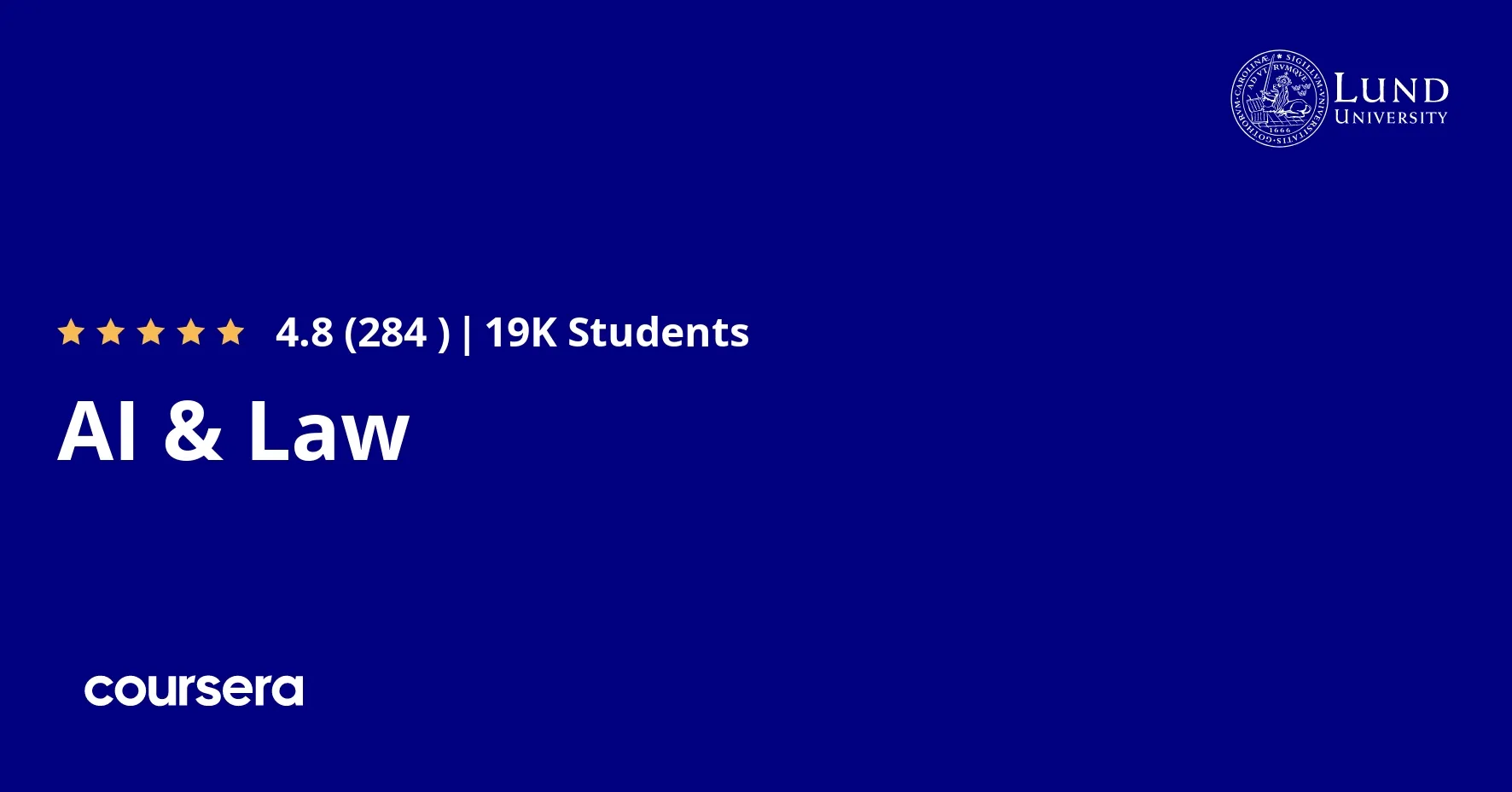
AI & Law 
The course aims to provide members of the general public with a basic understanding of the meaningful potential of AI in their own lives. The course also aims to help members of the general public understand the implications of using AI and how to interact with AI in a responsible, helpful, and conscientious manner. ▼
ADVERTISEMENT
Course Feature
![]() Cost:
Cost:
Free
![]() Provider:
Provider:
Coursera
![]() Certificate:
Certificate:
No Information
![]() Language:
Language:
English
Course Overview
❗The content presented here is sourced directly from Coursera platform. For comprehensive course details, including enrollment information, simply click on the 'Go to class' link on our website.
Updated in [March 06th, 2023]
AI & Law is a course designed to provide students with an understanding of the legal implications of artificially intelligent software and hardware. The course will cover the impact of artificial intelligence on the application and administration of law in the public sector, particularly in the context of criminal law enforcement, legal modelling, and administrative law. It will also explore the legal implications of using artificial intelligence software in the private sector in connection with innovation and associated intellectual property rights, in the financial services sector, and in predicting the outcomes of legal proceedings. Finally, the course will examine the significance of artificial intelligence in specific legal fields, such as labour law, competition law, and health law.
Throughout the course, students will gain an understanding of the legal implications of artificial intelligence and its impact on the application and administration of law. They will learn about the legal implications of using artificial intelligence software in the private sector, and the significance of artificial intelligence in specific legal fields. Students will also explore the ethical implications of artificial intelligence and its potential implications for the legal system.
By the end of the course, students will have a comprehensive understanding of the legal implications of artificial intelligence and its impact on the application and administration of law. They will be able to identify the legal implications of using artificial intelligence software in the private sector, and the significance of artificial intelligence in specific legal fields. Students will also be able to evaluate the ethical implications of artificial intelligence and its potential implications for the legal system.
[Applications]
The application of this course can be seen in the public sector, particularly in the context of criminal law enforcement, legal modelling, and administrative law. It can also be applied in the private sector in connection with innovation and associated intellectual property rights, in the financial services sector, and in predicting the outcomes of legal proceedings. Additionally, this course can be applied to specific legal fields, such as labour law, competition law, and health law.
[Career Paths]
1. AI Lawyer: AI Lawyers are responsible for researching and analyzing the legal implications of artificial intelligence software and hardware. They must be able to identify potential legal issues and develop strategies to address them. They must also be able to advise clients on the legal implications of using AI in their business. As AI technology continues to evolve, AI Lawyers will be increasingly in demand to help companies navigate the legal implications of their AI-related activities.
2. AI Legal Researcher: AI Legal Researchers are responsible for researching and analyzing the legal implications of artificial intelligence software and hardware. They must be able to identify potential legal issues and develop strategies to address them. They must also be able to advise clients on the legal implications of using AI in their business. As AI technology continues to evolve, AI Legal Researchers will be increasingly in demand to help companies navigate the legal implications of their AI-related activities.
3. AI Policy Analyst: AI Policy Analysts are responsible for researching and analyzing the legal implications of artificial intelligence software and hardware. They must be able to identify potential legal issues and develop strategies to address them. They must also be able to advise clients on the legal implications of using AI in their business. As AI technology continues to evolve, AI Policy Analysts will be increasingly in demand to help companies navigate the legal implications of their AI-related activities.
4. AI Regulatory Compliance Officer: AI Regulatory Compliance Officers are responsible for researching and analyzing the legal implications of artificial intelligence software and hardware. They must be able to identify potential legal issues and develop strategies to address them. They must also be able to advise clients on the legal implications of using AI in their business. As AI technology continues to evolve, AI Regulatory Compliance Officers will be increasingly in demand to help companies navigate the legal implications of their AI-related activities.
[Education Paths]
1. Bachelor of Science in Artificial Intelligence: This degree program focuses on the development of AI systems and their applications in various fields. It covers topics such as machine learning, natural language processing, computer vision, robotics, and more. Students will learn how to design, develop, and deploy AI systems, as well as how to use them to solve real-world problems. This degree is becoming increasingly popular as AI technology continues to develop and become more widely used.
2. Master of Science in Law and Artificial Intelligence: This degree program focuses on the legal implications of AI technology. It covers topics such as the ethical implications of AI, the legal implications of using AI in the private sector, and the impact of AI on the application and administration of law. Students will learn how to use AI to analyze legal data, how to develop legal models, and how to use AI to predict the outcomes of legal proceedings.
3. Doctor of Philosophy in Artificial Intelligence and Law: This degree program focuses on the intersection of AI and law. It covers topics such as the legal implications of AI, the ethical implications of AI, and the impact of AI on the application and administration of law. Students will learn how to use AI to analyze legal data, how to develop legal models, and how to use AI to predict the outcomes of legal proceedings. They will also learn how to use AI to develop legal strategies and how to use AI to improve the efficiency of legal processes.
4. Master of Laws in Artificial Intelligence: This degree program focuses on the legal implications of AI technology. It covers topics such as the ethical implications of AI, the legal implications of using AI in the private sector, and the impact of AI on the application and administration of law. Students will learn how to use AI to analyze legal data, how to develop legal models, and how to use AI to predict the outcomes of legal proceedings. They will also learn how to use AI to develop legal strategies and how to use AI to improve the efficiency of legal processes.
Course Syllabus
AI and Law Module
Legal AI in the Public Sector Module
Legal AI in the Private Sector Module
Selected Challenges
Pros & Cons

Offers better solutions to problems

Details AI's role in Private and Public Sector

Insightful and full of innovating ideas

Relates and understands AI to various disciplines of Law

Includes new content from 2021

Quizes too easy

Could have been more detailed
Course Provider

Provider Coursera's Stats at AZClass
Discussion and Reviews
0.0 (Based on 0 reviews)
Explore Similar Online Courses

Introduction to Knald for Materials and Texturing in 3d

Complete Linux Training Course to Get Your Dream IT Job 2020

Python for Informatics: Exploring Information

Social Network Analysis

Introduction to Systematic Review and Meta-Analysis

The Analytics Edge

DCO042 - Python For Informatics

Causal Diagrams: Draw Your Assumptions Before Your Conclusions

Whole genome sequencing of bacterial genomes - tools and applications

A Law Students Toolkit

Citizenship and the Rule of Law

Introduction to Intellectual Property
 Related Categories
Related Categories
 Popular Searches
Popular Searches
Quiz
 Submitted Sucessfully
Submitted Sucessfully
1. What is the purpose of AI & Law?
Correct Answer: To recognize the legal implications of artificially intelligent software and hardware.


Start your review of AI & Law